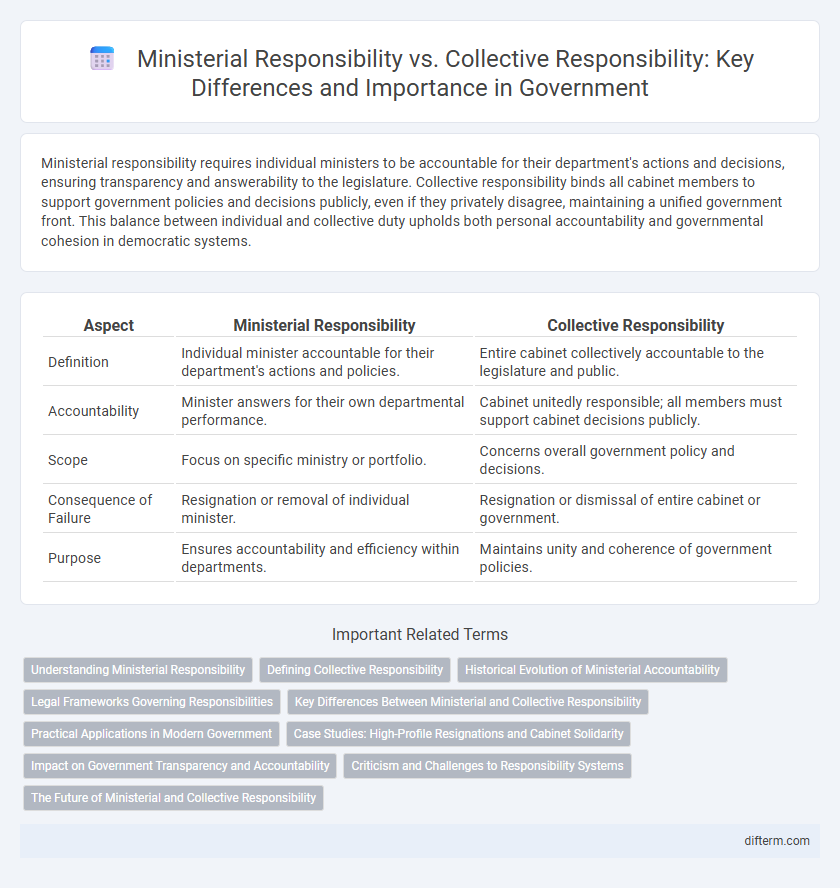Ministerial responsibility requires individual ministers to be accountable for their department's actions and decisions, ensuring transparency and answerability to the legislature. Collective responsibility binds all cabinet members to support government policies and decisions publicly, even if they privately disagree, maintaining a unified government front. This balance between individual and collective duty upholds both personal accountability and governmental cohesion in democratic systems.
Table of Comparison
| Aspect | Ministerial Responsibility | Collective Responsibility |
|---|---|---|
| Definition | Individual minister accountable for their department's actions and policies. | Entire cabinet collectively accountable to the legislature and public. |
| Accountability | Minister answers for their own departmental performance. | Cabinet unitedly responsible; all members must support cabinet decisions publicly. |
| Scope | Focus on specific ministry or portfolio. | Concerns overall government policy and decisions. |
| Consequence of Failure | Resignation or removal of individual minister. | Resignation or dismissal of entire cabinet or government. |
| Purpose | Ensures accountability and efficiency within departments. | Maintains unity and coherence of government policies. |
Understanding Ministerial Responsibility
Ministerial responsibility ensures that individual government ministers are accountable to the legislature and public for their personal conduct and the actions of their departments. It mandates transparent decision-making and requires ministers to resign in cases of significant policy failure or misconduct. This principle reinforces governmental accountability by linking ministerial actions directly to parliamentary scrutiny.
Defining Collective Responsibility
Collective responsibility in government refers to the constitutional convention where all cabinet members must publicly support and defend decisions made by the cabinet, regardless of personal views. This principle ensures unified decision-making and maintains government stability by requiring ministers to share accountability for policies implemented. Breaching collective responsibility can lead to a minister's resignation to uphold cabinet solidarity and public confidence.
Historical Evolution of Ministerial Accountability
Ministerial accountability has evolved significantly since the 18th century, originating from the principle that individual ministers are responsible for their personal conduct and their department's actions. This concept developed alongside the growth of constitutional monarchy, emphasizing ministers' obligation to Parliament for the execution of government policy. Over time, ministerial responsibility has been reinforced through legal precedents and parliamentary conventions, shaping modern democratic governance by ensuring transparency and accountability within the executive branch.
Legal Frameworks Governing Responsibilities
Ministerial responsibility is governed by legal frameworks that hold individual ministers accountable to parliament for their departmental actions and decisions, ensuring transparency and adherence to statutory obligations. Collective responsibility is enshrined in constitutional conventions and legal statutes that require the cabinet to present a unified stance, making the entire government accountable for policy decisions. These frameworks establish mechanisms for parliamentary oversight, judicial review, and potential sanctions to uphold both individual and collective accountability in government.
Key Differences Between Ministerial and Collective Responsibility
Ministerial responsibility requires individual ministers to answer for their department's actions and policies to the legislature, ensuring personal accountability. Collective responsibility mandates that all cabinet members publicly support and defend cabinet decisions, maintaining governmental unity and secrecy. Key differences include ministerial responsibility's focus on individual accountability versus collective responsibility's emphasis on unified cabinet solidarity and joint decision-making.
Practical Applications in Modern Government
Ministerial responsibility requires individual ministers to be accountable for their departments' actions, ensuring transparent decision-making and direct political accountability in modern governments. Collective responsibility mandates unified cabinet decisions, promoting stable governance by obliging ministers to publicly support agreed policies or resign, which enhances policy coherence and public confidence. Practical application often involves balancing these principles to maintain both individual accountability and collective unity in executive decision-making processes.
Case Studies: High-Profile Resignations and Cabinet Solidarity
Ministerial responsibility requires individual ministers to resign over departmental failures, exemplified by Robin Cook's resignation during the Iraq War, highlighting personal accountability. Collective responsibility demands that all cabinet members publicly support government decisions, even if privately dissenting, maintaining cabinet solidarity as seen in Margaret Thatcher's handling of the Westland affair. These principles balance transparency with unified governance, reinforcing trust and stability in parliamentary systems.
Impact on Government Transparency and Accountability
Ministerial responsibility ensures individual ministers are accountable for their department's actions, enhancing government transparency by enabling clear attribution of successes or failures. Collective responsibility requires the entire cabinet to support decisions publicly, promoting unified accountability but potentially obscuring specific departmental issues. This balance impacts public trust, as clear ministerial accountability fosters transparency, while collective responsibility safeguards cohesive governance.
Criticism and Challenges to Responsibility Systems
Ministerial responsibility faces criticism for blurred accountability when actions are delegated to civil servants, causing difficulty in pinpointing individual fault. Collective responsibility is challenged by ministers publicly dissenting, undermining government unity and confusing the electorate on policy stances. Both systems grapple with transparency issues, as political maneuvering often obscures real responsibility from public scrutiny.
The Future of Ministerial and Collective Responsibility
Ministerial responsibility ensures individual accountability of ministers to parliament for their department's actions, while collective responsibility mandates unified support for cabinet decisions, maintaining government stability. Future challenges include adapting these doctrines to increased political fragmentation and transparency demands, requiring clearer mechanisms for accountability and dissent within executive branches. Evolving governance models may blend traditional responsibilities with digital oversight tools to enhance responsiveness and public trust.
Ministerial Responsibility vs Collective Responsibility Infographic

 difterm.com
difterm.com